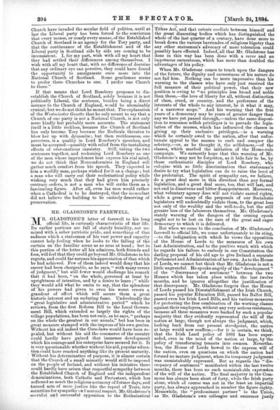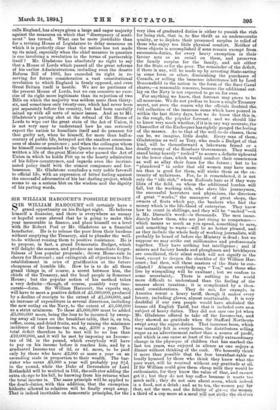MR. GLADSTONE'S FAREWELL.
MR. GLADSTONE'S letter of farewell to his long official life, is curiously characteristic of that life. Its earlier portions are fall of stately humility, not un- mixed with a sober patriotic pride, and something of that sadness which a statesman of his vast power and capacity cannot help feeling when he looks to the falling of the curtain on the familiar scene as so near at hand ; but in this portion of the letter all his admirers, both friends and foes, will feel that they could go beyond Mr. Gladstone in his regrets, and could far surpass his appreciation of that which he had achieved. Few of them indeed would deny that his career had been chargeable, as he says, " with many errors of judgment," but still fewer would challenge his remark that it had been, " on the whole, governed at least by uprightness of intention, and by a desire to learn ; " while they' would add what he omits to say, that the splendour of his powers had given to even his worst errors a grandeur of effect which will secure them a great historic interest and an enduring fame. Undoubtedly the " great legislative and administrative period " which he reviews, from the first Reform Bill to the Local Govern- ment Bill, which extended so largely the rights of the village populations, has been not only, as he says, " perhaps on the whole the greatest in our annals," but has been in great measure stamped with the impress of his own genius. Without his aid indeed the Corn-laws would have been re- pealed, but without his aid the commerce of the country could "hardly have gained that immense development which his courage and his enterprise have secured for it. It is very questionable whether without his aid, popular educa- tion could have reached anything like its present maturity. ' Without his determination of purpose, it is almost certain that. the Church of a small minority would still be imposed on the people of Ireland, and without his initiative there could hardly have arisen that respectful sympathy between the Established Church of England and the independent dennniinations, both Catholic and Protestant, which has softened so much the religious acrimony of former days, and turned acts of mere justice like the repeal of Tests, into securities for sympathy a n i mutual respect. Mr. Gladstone's scornful, and successful opposition to the Ecclesiastical Tithes Acit, and that entente cordiale between himself and the great dissenting bodies which has distinguished the whole of the last quarter of a century, have done more to break down the various barricades of religious bigotry than any, other statesman's advocacy of mere toleration could possibly have effected. Indeed, all that Mr. Gladstone has done in this way has been done with a verve and an impetuous earnestness, which has more than doubled the advantages of his policy.
When Mr. Gladstone comes to touch upon the dangers of the future, the dignity and earnestness of his nature do not fail him. Nothing can be more impressive than his warning to the classes who have only just received the full measure of their political power, that their new position is owing to "no principles less broad and noble than these,—the love of liberty for all, without distinction of class, creed, or country, and the preference of the interests of the whole to any interest, be it what it may, of a narrower scope." And his warning that the first years of a democracy may be years of greater danger than any we have yet passed through,—unless the same disposi- tion to renounce selfish privileges is to pervade the legis- lation of the masses, which has influenced the classes in giving up their exclusive privileges,—is a warning which he certainly owed to the nation, after that unfor- tunate appeal to the masses to curb and conquer the sobriety,—or, as he thought it, the selfishness,—of the classes, which marked the initiation of the Home-rule campaign. We earnestly hope that this warning of Mr. Gladstone's may not be forgotten, as it bids fair to be, by those enthusiastic disciples of Lord Rosebery, who eulogise with so little discrimination that statesman's desire to try what legislation can do to raise the level of the proletariat. The spirit of sympathy can, we believe, do a great deal more in this direction than any formal legislation, and a great deal more, too, that will last, and not end in disastrous and bitter disappointment. Moreover, what voluntary agency does will not violate sacred rights, while a great many of the proposals of our Socialistic legislators will undoubtedly violate them, to the great loss not only of the wealthy and the well-to-do, but the still greater loss of the labourers themselves. dr. Gladstone's stately warning of the dangers of the coming epoch ought not to be lost on the ears of the great and eager democracy to which it is delivered.
But when we come to the conclusion of Mr. Gladstone's farewell to official life, we come unfortunately to its sting, —to the indignation with which he views the opposition of the House of Lords to the measures of his own last Administration, and to the positive wrath with which he regards his failure to embody in our Constitution the darling proposal of his old age to give Ireland a separate Parliament and Administration of her own. As to the House of Lords, we cannot but think that Mr. Gladstone is not a little ungrateful. He speaks angrily of the " development " of the " discrepancy of sentiment " between the two Houses which has taken place within the last twelve months, and he ignores altogether the justification of that discrepancy. Mr. Gladstone forgets that the fiouse of Lords passed his Disestablishment of the Irish Church, passed his popular Education Bill, passed his Ballot Bill, passed even his Irish Land Bills, and his various measures for protecting the free combination of the working classes against their employers, without any very serious resistance, because all these measures were backed by such a popular majority that they evidently represented the will of the nation at large, though not always the judgment, which, looking back from our present standpoint, the nation at large would now reaffirm ;—for it is certain, we think, that the Irish Land policy of 1881 has been super- seded, even in the mind of the nation at large, by the policy of transforming tenants into owners. Neverthe- less, the House of Lords bowed to the express will of the nation, even on questions on which the nation had formed no mature judgment, when its temporary judgment was unmistakably expressed. But as regards the " dis- crepancy of sentiment" manifested within the last twelve months, there has been no such unmistakable expression of the will of the nation. The final majority in the Com- mons has always been short of forty, while the Irish party alone, which of course was not in the least an impartial party, has always approached in number the figure eighty. Meanwhile, the " predominant partner" in the Union, as Mr. Gladstone's own colleague and successor justly calls England, has always given a large and eager majority against the measures on which that " discrepancy of senti- ment" has turned. What can be more justifiable than for a revising House of Legislature to delay measures on which it is perfectly clear that the nation has not made up its mind, especially when the chief measure in question is one involving a revolution in the terms of partnership itself ? Mr. Gladstone has absolutely no right to say that a House of Lords which, passed all the great reforms of his earlier Administrations, including even the drastic Reform Bill of 1885, has exceeded its right in re- serving for future consideration a vast constitutional revolution to which England is firmly opposed, and even Great Britain itself is hostile. We are no partisans of the present House of Lords, but we can conceive no exer- cise of its right more legitimate than its rejection of two Bills on which the majority was seldom more than thirty- six, and sometimes only twenty-one, which had never been put separately before the country, but had been carefully mixed up with all sorts of minor issues. And as to Mr. Gladstone's parting shot at the refusal of the House of Lords to wipe out the great stain of the Act of Union, it is not very easy to understand how he can seriously expect the nation to humiliate itself and do penance for that guilty act, when he himself, for more than half-a- century of public life, betrayed not the smallest conscious- ness of shame or penitence ; and when the colleague whom he himself recommended to the Queen to succeed him, has written a life of the great Minister who passed the Act of Union in which he holds Pitt up to the hearty admiration of his fellow-countrymen, and regards even the incrimi- nated policy itself with the utmost composure and for- bearance. Mr. Gladstone concludes a very noble farewell to official life, with an expression of bitter feeling against the successful adversaries of his last darling project, which seems to us a serious blot on the wisdom and the dignity of his parting words.



































 Previous page
Previous page